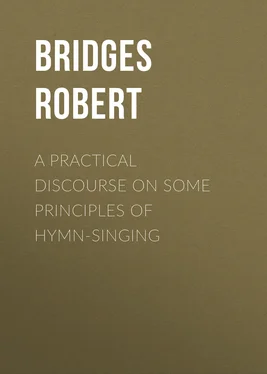All these last-named emotions,–which I have taken from congregational hymn-books,–and I suppose there may be more of them,–call for delicacy of treatment. A Lamentation, for instance, which might seem at first sight as if it would gain force by volume, will, if it is realistic or clumsy, become unmanly, almost so as to be ridiculous, and certainly depressing to the spirit rather than purifying. In fact while many of the subjects require beautiful expression, they are also more properly used when offered as inspiring ideals; and to assume them to be of common attainment or experience is to degrade them from their supreme sanctity. But in thus ruling them unfit for general singing one must distinguish large miscellaneous congregations from small united bodies, in which a more intimate emotion may be natural: and as there is no exact line of distinction here, so there is no objection to the occasional and partial intrusion of some of these more intimate subjects into congregational hymns.
To this first question then, as to what emotions are fit to be expressed by congregational music, the answer appears to be that the more general the singing, the more general and simple should be the emotion and that the universally fitting themes are those of simple praise, prayer, or faith: and we might inquire whether one fault of our modern hymn-books may not be their attempt to supply congregational music to unfitting themes.
To the next question, Whose emotion is this congregational music to excite or heighten? the answer is plain: It is the average man, or one rather below the average, the uneducated, as St. Augustin says the weaker, mind and that in England is, at least artistically, a narrow mind and a vulgar being. And it may of course be alleged that the music in our hymn-books which is intolerable to the more sensitive minds was not put there for them, but would justify itself in its supposed fitness for the lower classes. 'What use,' the pastor would say to one who, on the ground of tradition advocated the employment of the old plain-song and the Ambrosian melodies, 'What use to seek to attract such people as those in my cure with the ancient outlandish and stiff melodies that pleased folk a thousand years ago, and which I cannot pretend to like myself?' Or if his friend is a modern musician, who is urging him to have nothing in his church but what would satisfy the highest artistic sense of the day, his answer is the same: he will tell you that it would be casting pearls before swine; and that unless the music is 'tuney' and 'catchy' the people will not take to it. And we cannot hastily dismiss these practical objections. The very Ambrosian music which is now so strange to modern ears was doubtless, when St. Ambrose introduced it, much akin to the secular music of the day, if it was not directly borrowed from it: and the history of hymn-music is a history of the adaptations of profane successes in the art to the uses of the Church. Nor do I see that it can ever be otherwise, for the highest music demands a supernatural material; so that it would seem an equal folly for musicians to neglect the unique opportunity which religion offers them, and for religion to refuse the best productions of human art. And we must also remember that the art of the time, whether it be bad or good, has a much more living relation to the generation which is producing it, and exerts a more powerful influence upon it, than the art of any time that is past and gone. It is the same in all aspects of life: it is the book of the day, the hero or statesman of the hour, the newest hope, the latest flash of scientific light, which attracts the people. And it must be, on the face of it, true that any artist who becomes widely popular must have hit off, 'I know not by what secret familiarity,' the exact fashion or caprice of the current taste of his own generation.
Конец ознакомительного фрагмента.
Текст предоставлен ООО «ЛитРес».
Прочитайте эту книгу целиком, купив полную легальную версию на ЛитРес.
Безопасно оплатить книгу можно банковской картой Visa, MasterCard, Maestro, со счета мобильного телефона, с платежного терминала, в салоне МТС или Связной, через PayPal, WebMoney, Яндекс.Деньги, QIWI Кошелек, бонусными картами или другим удобным Вам способом.
Confess. ix. 6.
Ibid. ix. 7.
This is perhaps rather a quality proper to the sensation.
'Et vix eis praebeo congruentem [locum].' which might only mean 'I cannot find the right place for them.'
Confess. x. 13.
St. Augustin does not allow that a vague emotion can be religious; it must be directed. Few would agree to this.












